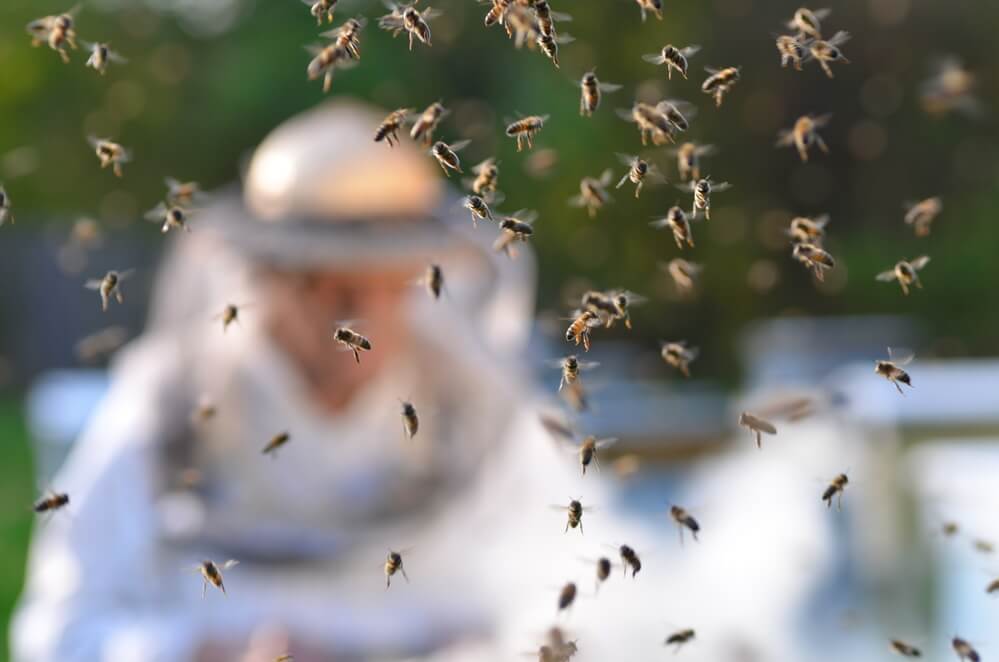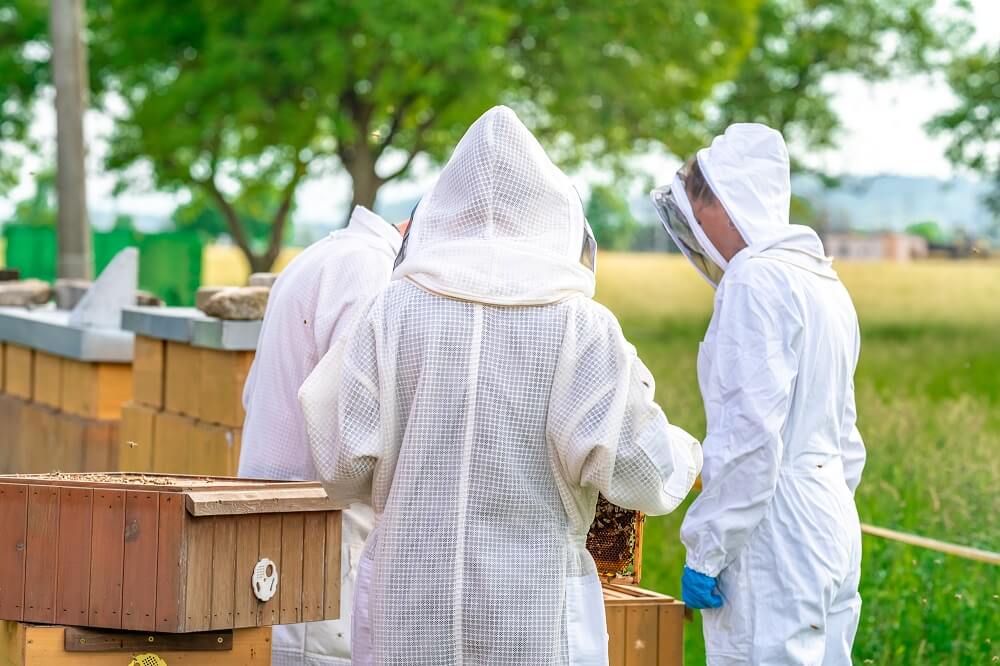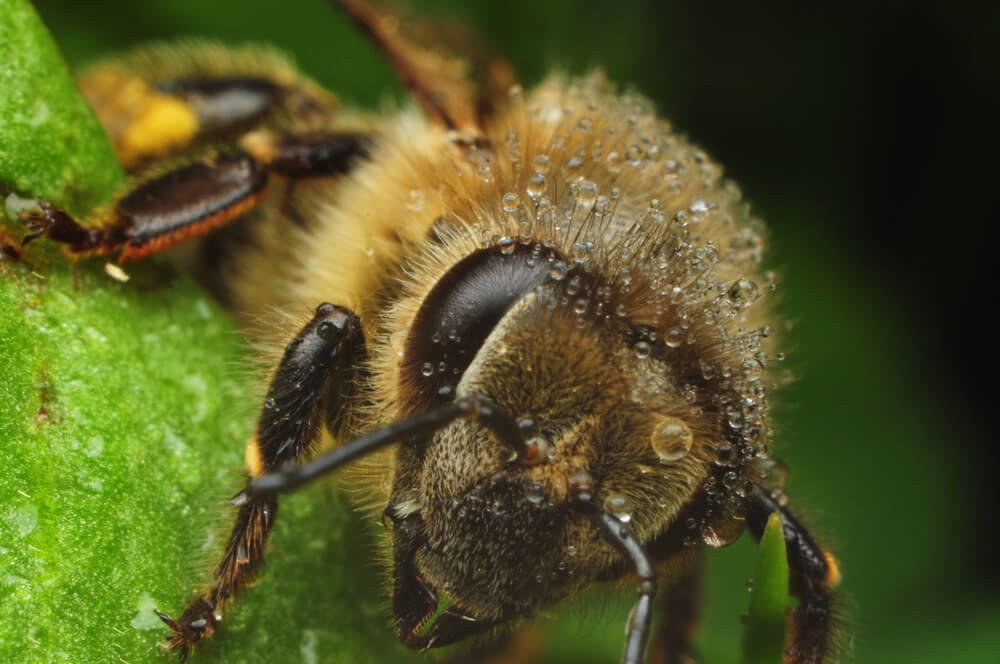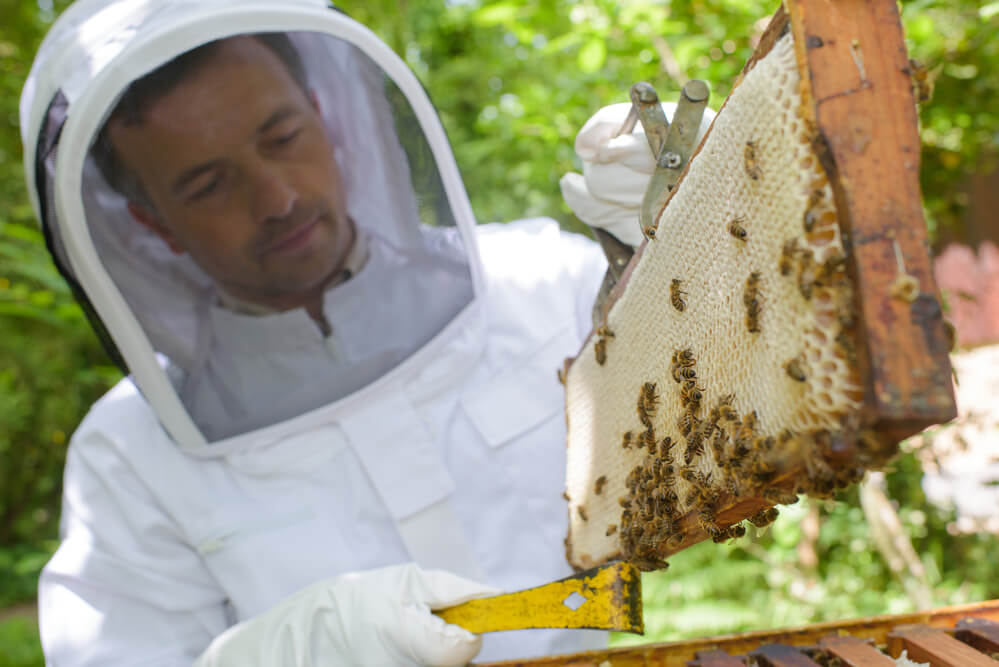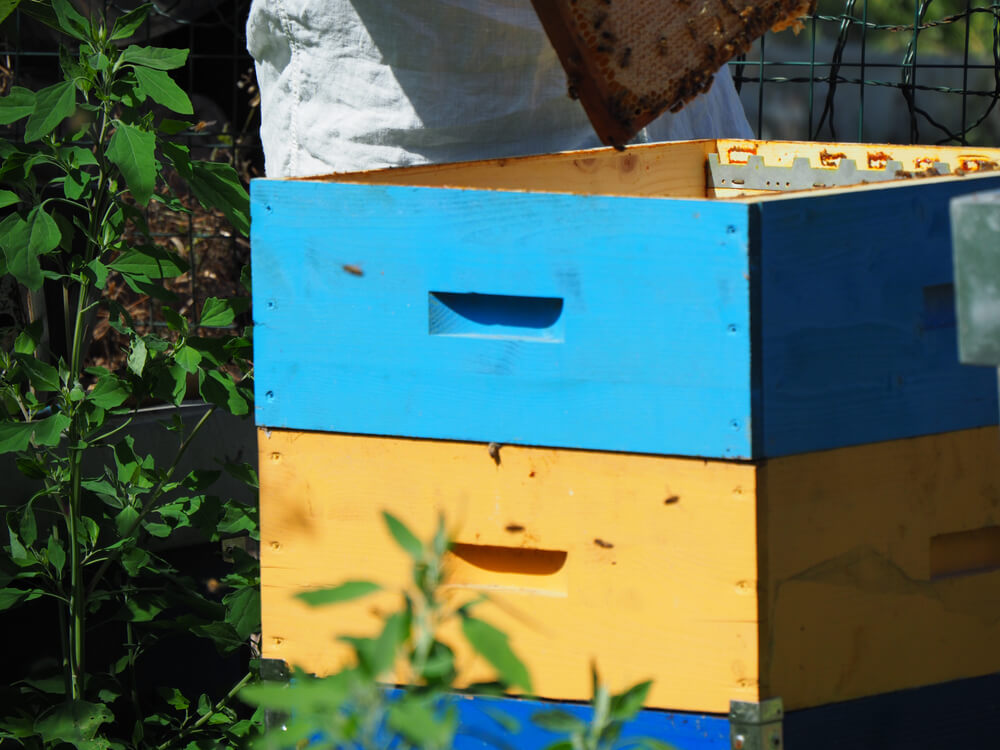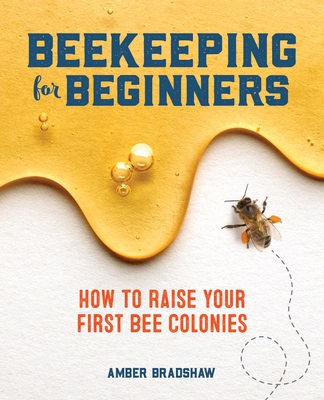Table of Contents:
Why Do I Have Mean Bees?
It’s the million-dollar question…
Why are my bees so aggressive?
The truth is that honeybee colonies can have perfectly natural mood swings, depending on the season, weather, and other factors.
However, there are certain things that can set them off.
Let’s discuss a few.
Reason #1: Queenless Hives Can Result in Mean Bees
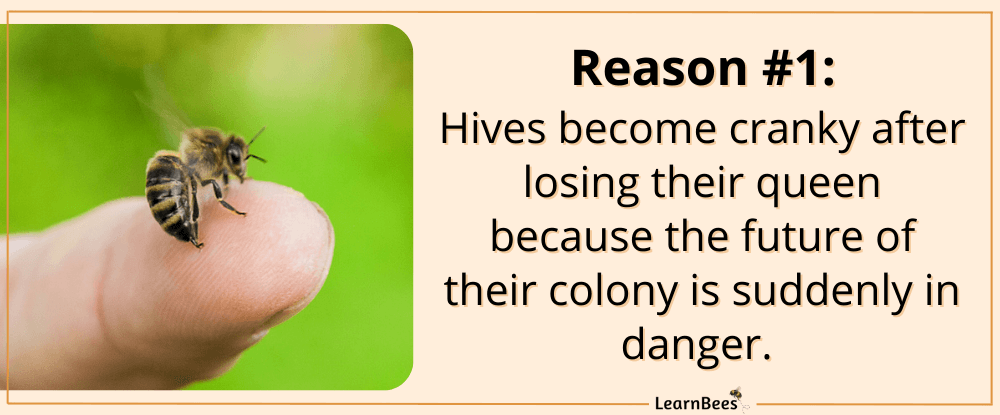
When a colony loses their queen, they can get pretty upset.
And for good reason.
They rely on their queen to lay over 2,000 eggs per day. If she unexpectedly dies, then suddenly, the future of the hive becomes in jeopardy. As a result, the colony can quickly go into a full-blown panic and start attacking everything in sight.
But the good news?
This bad behavior typically stops after you requeen the hive.
After mating, the new queen will begin laying fertilized eggs, releasing pheromones, and setting the overall tone for the hive. As a result, the hive will no longer be in a frantic struggle to replace its queen.
Reason #2: Nectar Dearths Can Lead to Mean Bees
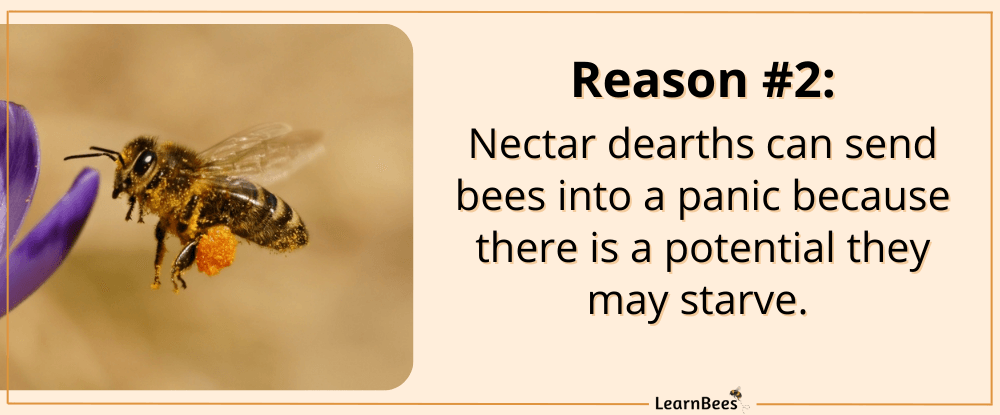
Nectar dearths occur when there is a shortage of nectar-producing flowers.
For example:
Hot, dry summers with little rainfall often result in wilting flowers and decreased nectar production. Since bees struggle to find nectar during these periods, they’ll steal it from other colonies. This is known as “robbing.”
Keep in mind:
A summer nectar dearth can wipe out entire bee colonies.
This is because summer dearths happen when bee populations are very high. Large colonies of bees require a lot of food and can empty their honey storage quickly. If the beekeeper has already harvested the honey, the problem worsens.
To add insult to injury?
Nectar robbing can result in piles of dead bees, including queen bees.
The first way to resolve this is to understand the signs of a nectar dearth. A few signs include:
- Your colony is buzzing louder, almost as if they’ve been disturbed.
- You’ll sometimes see bees on flowers they’d normally avoid.
- Bees will often re-visit flowers multiple times in hopes of finding nectar.
- Your bees are found in weird places such as on your car, the side of your house, or crawling around on the grass beneath their hive. Bees with no flowers to forage on can’t complete their job duties. They may act confused, bored, or displaced.
- Bees become attracted to hummingbird feeders or other sugary substances like fruit fallen from trees.
Secondly, you’ll need to feed your colony sugar water if they’re low on stores. This will prevent them from starving.
With that in mind:
You don’t want to use an entrance feeder for your hives because it can attract other robbers from miles around directly to your hive.
Not good.
Instead, try an enclosed or internal hive-top feeder and avoid spills and drips.
There are other things to avoid during nectar dearths, including:
- Do not use essential oils or Honey-B-Healthy in the sugar water since these products can attract robbing bees from the area.
- Reduce hive entrances and consider using a robbing screen for small or weak colonies.
- Close upper entrances, so your bees don’t have to defend multiple entrances. Use a screened inner cover with screened ventilation ports if you need ventilation.
- Do not place community feeders or wet frames near your hives. This can start a robbing frenzy. If you want the bees to clean the wet frames, place them in a super inside the hive.
Reason #3: Bees Can Become Mean During Bad Weather
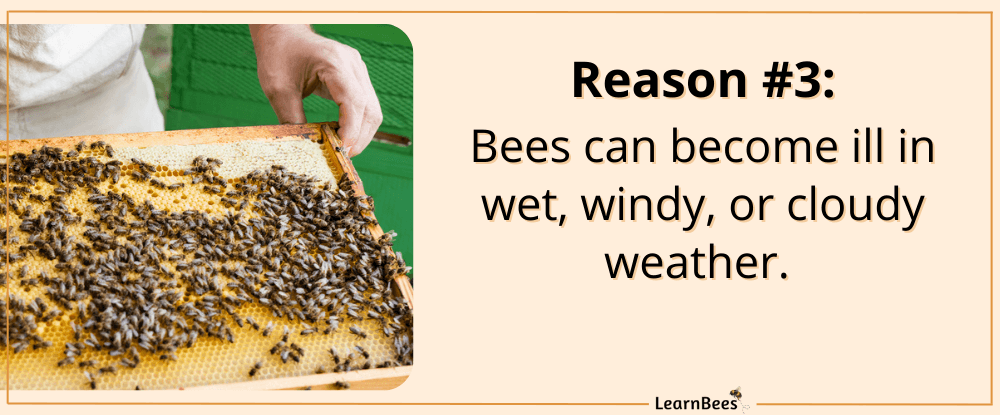
They can also become cranky when the weather is extra hot and humid – like during the dog days of summer.
In such cases, all you can do is understand that this is natural. Your bees can’t help it, and neither can you. Just make sure you’re not performing hive inspections during rainy or excessively windy days.
Reason #4: Predators Can Put Bees in a Bad Mood
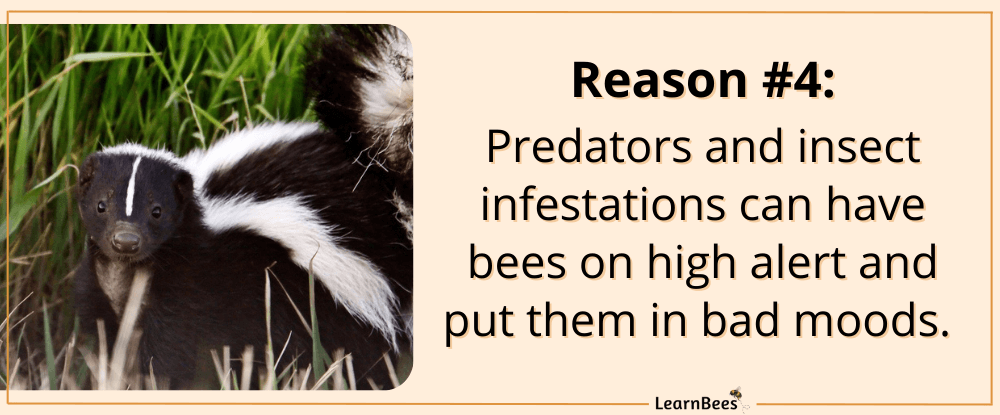
Let’s face it.
Bees have tons of predators. Everything from skunks, to bears, to rodents, to other insects. This results in increased defensiveness of the hive.
But here’s the thing:
Predators don’t always leave behind an obvious trail. For example, small predators can sneak around your beehive without you even realizing it the next day. Skunks can be a major predator for bees, only coming at night and enticing the bees to exit the hive so they can be eaten.
As such, you can’t always tell whether a skunk or other critter has been creeping around your hives.
And unfortunately, predators from the night before can have your bees in a grumpy mood all day long.
In this case, the best thing to do is try to find the source of the issue and remove it.
Reason #5: A Mean Queen Can Lead to Mean Bees
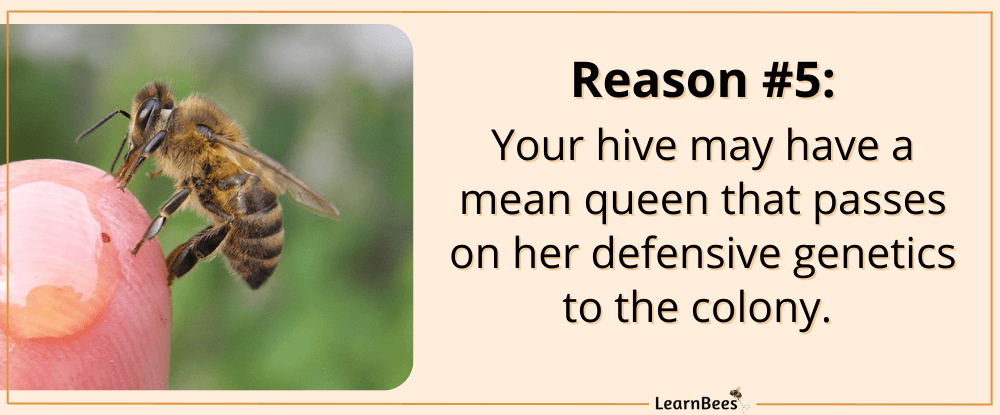
The queen is the mother of the colony members, passing on 50% of her genetic material to them.
And here’s the bottom line:
Some hives have genetics that makes them more defensive than others. So if the queen is feisty, the hive is more likely to be feisty. If the queen is calm, the hive will most likely be too.
Your colony may eventually replace their queen with a new queen that’s more docile.
Reason #6: Hive Inspections Stresses Bees Out
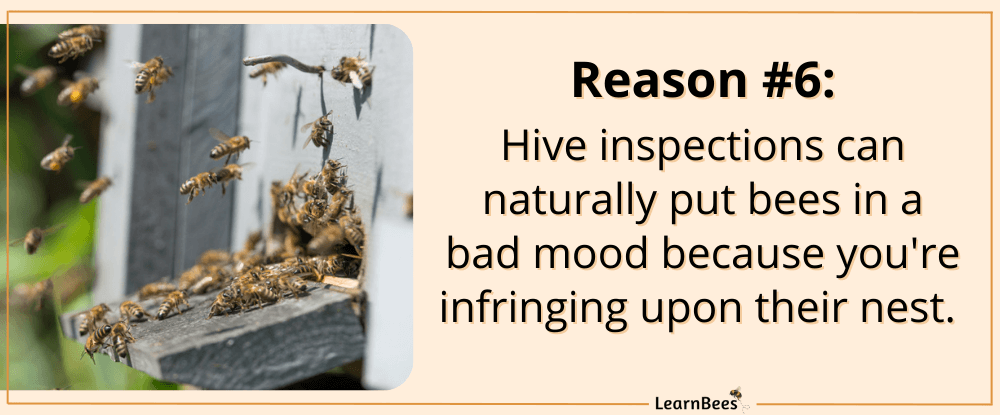
It’s understandable.
Most people would also be upset if someone came into their homes and started poking around. This is only natural, and bees are no different.
In fact, sometimes hive inspections can leave bees cranky for several days afterward.
The only thing you can do to mitigate this is to inspect your hives during clear, sunny weather in the early afternoon. Also, use a bee smoker during inspections to help calm the hive.
Additionally, remember that bees are sensitive to odors. Sweat or strong scents can alter the temperament of your hive, so wash your bee suit and gloves occasionally.
And it’s worth mentioning:
Don’t wear dark colors in your apiary. Most bee predators are darkly colored, such as skunks, bears, and even insects. This is why it’s best to wear white.
Reason #7: Your Mean Bees Actually Might be Africanized
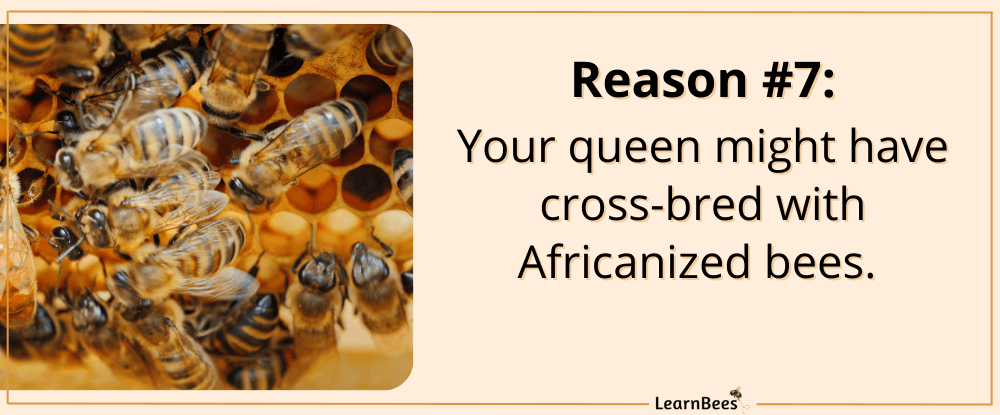
Africanized colonies are much more defensive than the European honeybees we’re used to. They’re known as “killer bees” and will chase people up to a quarter mile away from their hive.
So you might be asking…
How do my bees become Africanized in the first place?
Simple.
Bees become Africanized through cross-breeding. An Africanized drone will mate with a virgin European queen and pass on those genetics.
Africanized honeybees are located in:
- California
- Texas
- Nevada
- Arizona
- New Mexico
- Oklahoma
- Louisiana
- Arkansas
- Florida
With that said, just because you don’t live in an area with Africanized bees doesn’t mean your hive hasn’t become Africanized. Some Africanized genes can travel in a package of bees that you order online.
However, the only way to know if your colony has become Africanized is to get them tested by a lab. If you think this has happened to you, try re-queening your hive with a mated queen to see if it solves the issue.
And remember:
It doesn’t mean you have Africanized honeybees just because you’re dealing with a cranky hive.
How Do I Deal With Mean Bees?
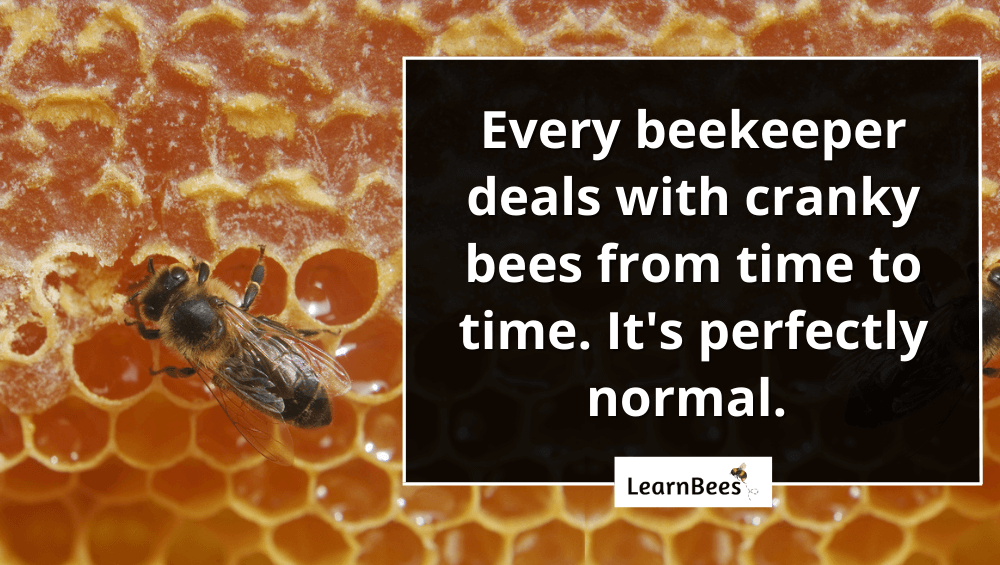
The first thing to know is that bees are naturally defensive over their nests. This doesn’t make them aggressive. It simply means they’re protecting themselves from threats.
So, in a nutshell:
It doesn’t mean there is something wrong with your colony just because they’re cranky.
Hive inspections, bad weather, nectar dearths, and predators are all valid reasons for “mean” bees. The best way to handle these issues is to follow the tips above.
For example, you can supplement your colonies with sugar water during a nectar dearth. You’ll just want to remember not to use entrance feeders since this can attract robbing bees to your apiary.
Secondly, remember to wear your protective gear and keep pets and children away from defensive hives.
Should I Destroy a Colony of Mean Bees?
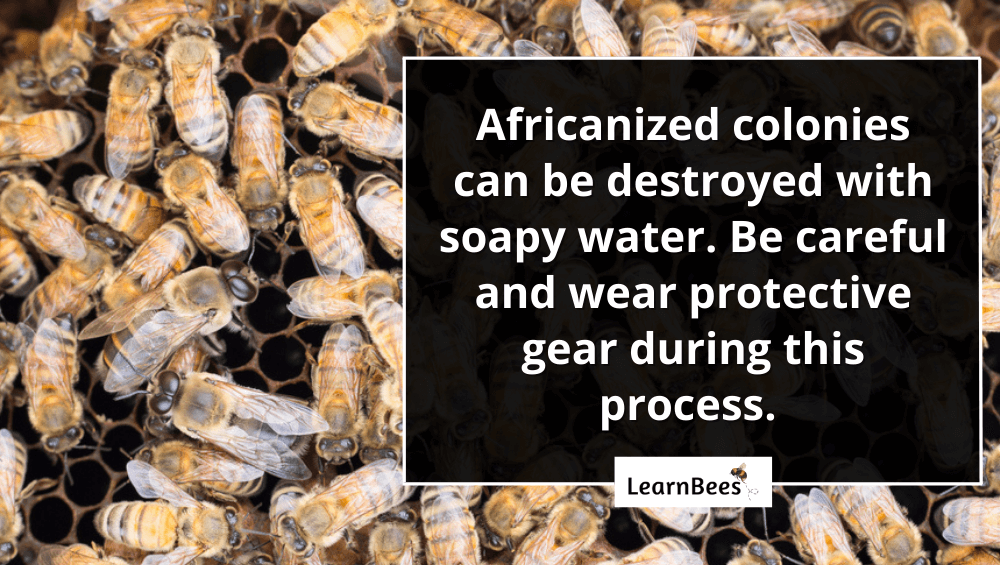
You should destroy them only if you believe they’re Africanized.
The biggest clue for Africanized bees is that they will go after anyone even if you’re not close to their hive. They’re also not quick to calm down.
For example, one beekeeper I know caught an Africanized swarm. Even 6+ hours after he moved them into a regular hive, he couldn’t go within 100 yards of them or they would chase him relentlessly.
In contrast, a swarm of European honeybees is typically very gentle. Plenty of beekeepers have caught European honeybee swarms with no protective suit whatsoever.
But Africanized honeybees are a different story.
They can become aggressive while swarming and chase you long distances to attack.
So how do you destroy Africanized bees?
The best thing to do is spray them with soapy water to kill them. Soapy water inhibits their breathing ability. The good news is that it doesn’t leave a harmful residue behind like many chemicals would.
However, you need to be cautious and wear your best protective gear during this process.
Spraying the Africanized bees with soapy water will take several minutes or more to work, depending on how well you can spray them. Be careful to protect yourself, children, and pets in the area.
And remember:
If you’re a new beekeeper, it’s best to get advice from an experienced beekeeper in your area before doing anything drastic.
FAQs on Mean Bees
- Which bees are most aggressive?
- Why are my bees so aggressive?
- How do you deal with aggressive bees?
- How can you tell if a bee is aggressive?
- Why do bees chase you?
- Why are bees aggressive in the late summer?
Which bees are most aggressive?
People often ask, “What are the worst bees?” and “Are there any aggressive bees?”
Africanized honeybees are the most aggressive, which is why they’re nicknamed “killer bees.”
These bees are a hybrid of the European honeybee and the African honeybee. They were initially brought to Brazil in the 1950s in an attempt to increase honey production.
But the Africanized bees quickly began to spread. They eventually made their way into the southern United States, where they began to hybridize with the European honeybees.
This bee species, which looks exactly like its European honeybee counterpart, has a far more aggressive disposition. Although their venom is no more potent than the typical honeybee, the danger comes from the fact that “killer” bees assault in far more significant numbers, generally the entire colony.
—> Go back to the FAQs on mean bees
More to Explore:
Why are my bees so aggressive?
There can be several reasons why your bees might be acting aggressively. It could be due to a lack of food, bad weather, hive inspections, or predators.
Hive inspections, bad weather, nectar dearths, and predators are all valid reasons for agitated bees, and they shouldn’t be cause for concern.
—> Go back to the FAQs on mean bees
More to Explore:
How do you deal with aggressive bees?
It depends on why they’re aggressive.
You can try feeding them sugar water if it’s due to a lack of food. You can also ensure there are no hive inspections while the weather is bad.
If it’s due to predators, you can try to find the source of the problem and remove it. You can also keep pets and children away from defensive hives.
But in some cases, there is very little you can do to calm them. Hive temperaments can go in waves, and it’s natural.
—> Go back to the FAQs on mean bees
More to Explore:
How can you tell if a bee is aggressive?
Simple, aggressive bees will relentlessly chase or buzz around you even when you aren’t close to their hive.
—> Go back to the FAQs on mean bees
More to Explore:
Why do bees chase you?
People regularly ask:
How far will mean bees chase you? How do you make mean bees go away? How long do bees stay agitated?
Bees chase you because they’re trying to protect their hive. However, most bees will only chase you a few feet away from their hive. They won’t stay agitated long if you give them a healthy space away from their nest.
—> Go back to the FAQs on mean bees
More to Explore:
- How Many Bees Are in a Hive?
- What is Backyard Beekeeping?
- Honey Extractors 101: Everything You Need to Know
Why are bees aggressive in the late summer?
Bees can become aggressive for many reasons. One common reason is that nectar shortages may be happening in your area. This occurs during hot and dry summers when flowers wilt.
